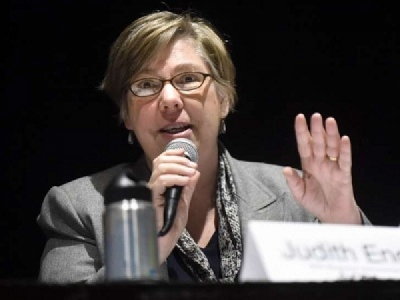
Posted on February 6, 2018
By Kathleen Moore The Post Star
The Hudson River would be cleaner if there were more dredging, said former Regional EPA Administrator Judith Enck.
Speaking at a Post-Star Editorial Board meeting, she said EPA had to compromise to get General Electric to commit to any cleaning of the river. GE eventually removed almost 70 percent of the PCBs from the areas it dredged, but the water is still heavily contaminated.
“GE made a terrible mistake fighting this for years. But once they started doing it, they did a good job,” Enck said. “We got a lot of PCBs out of the hot spots.”
Still, she said it was clear that more dredging would vastly improve the river’s health.
“I would love more dredging to happen,” she said. “But there needs to be a legal mechanism for it to happen.”
She praised the Hudson River Natural Resource Trustees for documenting injuries caused by PCBs, but said they have spent too long studying the problem. The trustees released a report Wednesday, declaring that PCBs had injured natural resources, but did not say what they want GE to do about it. That’s their next step, they said.
Enck groaned at that.
“Next step! You know how often I have heard ‘next step?’” she said. “There’s a good chance I’ll be dead before they bring their action (against GE).”
She doesn’t intend to criticize them; she just wants them to take action now.
“I appreciate their scientific rigor, but they have to pick up the pace,” she said. “They’re way too slow. They’ve got to get to the table.”
Typically, once trustees bring an action, the polluter agrees to fix the problem after a negotiated settlement.
Enck isn’t holding out hope for that to happen soon. She is more encouraged by the idea of the state taking GE to court over the cost of dredging the Champlain Canal. EPA could not dredge the canal because it was considered “navigational dredging.” But the state hasn’t dredged the canal because of the high cost of removing sediment polluted with PCBs.
She is confident the state would win a case forcing GE to pay for that dredging.
It would get a “huge amount of PCBs” out of the river, she said.
While she was regional administrator, she tried to push the state to take action. She wanted to keep the dredging operation in Fort Edward functional on the grounds of efficiency for dredging the canal, but could not if the state wasn’t at least starting the process of getting GE to dredge the canal.
“I called the Canal Corporation many, many times,” she said. “I said, before all the equipment comes down, you should move.”
At one point, the Canal Corp. did file paperwork with the Corps of Engineers to get a permit for Champlain Canal dredging. Later, the state backed off.
“It has been a huge frustration that the state has not moved forward with that,” Enck said. “Dredging the Champlain Canal, that’s real removal.”
Enck also defended the EPA’s effort, saying the agency had to compromise with GE to get the cleanup done at all.
“Look, the Superfund is running on fumes. The actual work that was done in six years would’ve taken us 50 years,” she said. “So we had to reach an agreement with GE.”
Source: The Post Star





